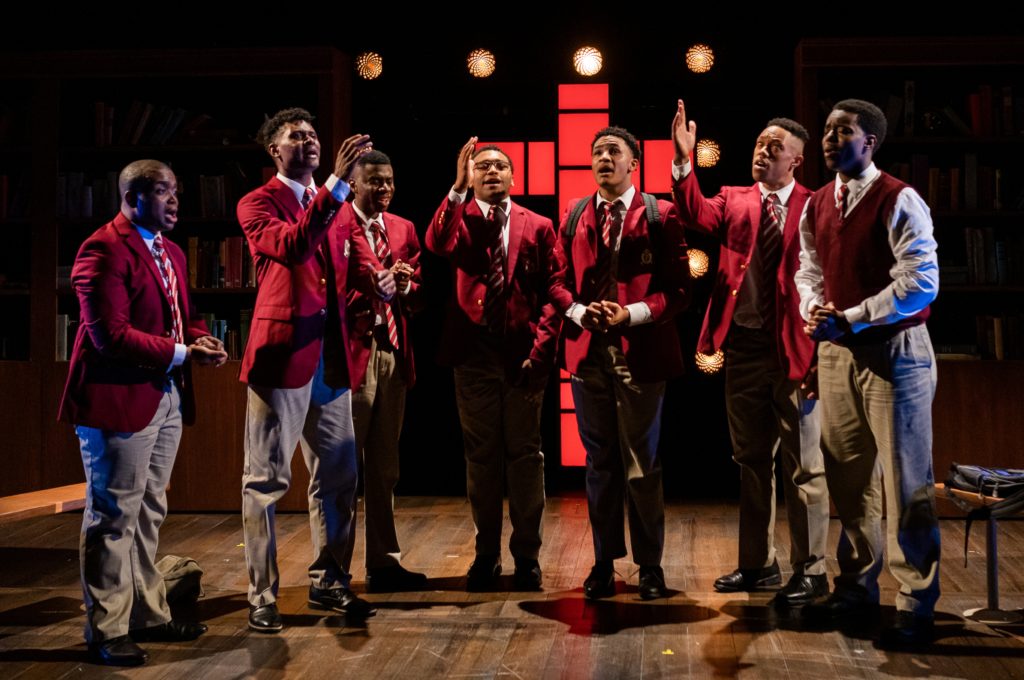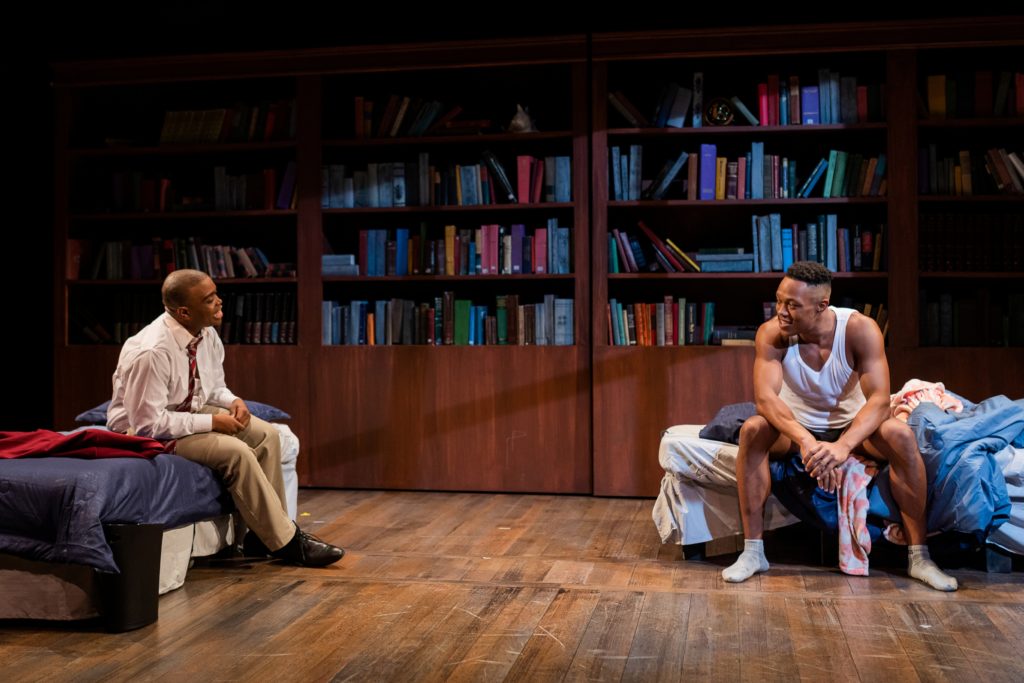
The cast in “Choir Boy.” Photo by Nile Scott Studios.
Presented by SpeakEasy Stage Company
By Tarell Alvin McCraney
Directed by Maurice Emmanuel Parent
Musical Direction by David Freeman Coleman
Choreography by Yewande Odetoyinbo and Ruka White
Sept. 13 – Oct. 12, 2019
Stanford Calderwood Pavilion at the Boston Center for the Arts
Boston, MA
SpeakEasy on Facebook
Review by Shiyanbade Animashaun
(Boston, MA) Choir Boy opens on a sole figure, David (Dwayne P. Mitchell), a student at the elite Charles R. Drew Prep School. He looks into the audience with intent as he begins to step dance. It is deliberate, slow and unaccompanied. The routine then increases in intensity and volume as more students appear. They flank the audience, on their way to the stage, with percussive dancing and chanting. Among the students, I noticed Bobby Marrow (Malik Mitchell) right away. He often seemed moments away from breaking into a joyous smile, mirroring my own.
I also noticed the lighting made it difficult to distinguish each student’s face. Headmaster Marrow (J. Jerome Rogers), Bobby’s uncle, arrives to introduce the choir. Thereafter, each choir member is clearly illuminated. They stood in two rows as Pharus Young (Isaiah Reynolds) led them in singing “Trust and Obey.” Afterward the choir clears, the stage is set with a bench and a desk. The Headmasters office.
Scenes transitioned with step dancing, song, or snippets of conversations from James Baldwin and more. They cleared sets with no pomp as bookcases were shifted, lockers placed, and benches arranged. That is, save for one blink-and-you’ll-miss-it flourish that produces seating on the heels of students dancing in Drew Prep maroon sweaters, cardigans, and jackets. I took delight in the beds: folded up, rolled out, unclipped, and lightly dressed. Pharus and AJ’s (Jaimar Brown) shared bedroom.
The cast of 10 men shone a light on the variances of masculinity, the importance of compassion, and moments of crucial communication. Choir Boy showed the later in the spectacular yet subtle moments when the students call home. Each illuminated, to varied efficiency, by a single spotlight, they deliver their half of a conversation to the audience.
These layered partial discussions are full of unfinished phrases and possible fear towards guardians. David Heard (Dwayne P. Mitchell) asks for permission to call, though it is the designated phone hour. Later he seems stifled by having to settle for a stiff conversation with his father, instead of getting to talk to his mother. In contrast, AJ has a relaxed and jovial call with his parents.
Misconceptions and communication issues are also shown. Mr. Pendleton, the lone White character, surprises the students with a sign that he may not be a stranger to Black American culture. Again, when Pendleton reacts to the N-word as ‘ugly’ and ‘words [they] don’t know anything about’. It’s shown as Headmaster Marrow struggles to discipline, then counsel Pharus by asking him to ‘tighten up’ as a euphemism akin to “we won’t ask, so don’t you tell.”

Isaiah Reynolds and Jaimar Brown; Photo by Nile Scott Studios.
The slow way you see other characters come of age allows their humanity to shine through as well. Whether through a moment of curiosity and later compassion towards a friend, battling with oneself, taking umbrage to benefit another, facing past actions, describing an intimate act as ‘people being people’, or questioning: ‘Would you rather be feared or respected?’.
Among all this, there are many laughs and instances of #blackboyjoy. Cutting remarks show a legacy vs. scholarship student friction. There is a classroom dissection of the history of Negro spirituals, and even two fantasy-esque sequences. In one, a shy student practicing a solo imagines himself performing to an adoring crowd with a set of backup dancers. The other is the plays’ final moment of music and dance which transports the cast, and audience, to a ball.
Without knowing McCraney’s earlier works, Choir Boy would stand as a tale where characters reckon with both their humanity and the humanity of others. Knowing the Oscar winning Moonlight, this is no surprise. Here there are no villains, despite the villainy of one’s actions. Though a viewer may disagree with certain actions, the play seems to want audiences to understand how those actions came to be.
Like its opening sequence, Choir Boy burns into you over time, with a laughter eliciting remark here and a look from a character in the shadows there. Statements and activities mentioned and forgotten, lend to the feeling of a world that lives on after the final bow. It adds the themes of coming of age, sexuality, race, class, and family into a rhythm kept as fine as the choreography by Yewande Odetoyinbo and Ruka White. I was on my feet with most of the audience at the end of the almost 2 hour experience wishing there was more.
As the standing ovation washed over Isaiah Reynolds and the cast, I wondered if the love and respect shown to the actors in this coming of age tale could continue. Say, if the cast members were encountered in the streets of Boston, where many of them schooled or hailed? I hope so, and as Headmaster Marrow suggests, to be respected may be better than to be feared.
